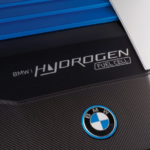Blockchain technology is a time-stamped series of transactions that are linked together mathematically, to form a “chain.” using a cryptographic algorithm (fancy math) in a way that makes it impossible for the chain to be modified.
Volvo is using it to guarantee that the batteries in its EVs aren’t made from “conflict minerals.”
“We have always been committed to an ethical supply chain for our raw materials,” said Martina Buchhauser, head of procurement at Volvo Cars. “With blockchain technology we can take the next step towards ensuring full traceability of our supply chain and minimizing any related risks, in close collaboration with our suppliers.”
That kind of warm, happy sentiment may seem like simple PR-speak, but it’s very real.
Real enough, at least, that Volvo’s been named to Ethisphere’s list of World’s Most Ethical Companies for the last three years in a row — and the company’s extremely proud of that fact.
So, how does it work?
Volvo’s suppliers use blockchain to track a mineral’s origin (in this case, cobalt), each sample’s physical attributes (like weight and size), the chain of custody for each sample as it passes from mine to truck to warehouse and beyond.
And the information that’s used to help establish that participant’s behavior — information like how long it takes to get a sample into a truck and to a given warehouse, for example, so that any suspicious delays can be tracked and, ideally, accounted for.
Technology firms Circulor and Oracle operate the blockchain technology across CATL’s supply chain, while the Responsible Sourcing Blockchain Network (RSBN), together with responsible sourcing specialists RCS Global and IBM, is rolling out the technology in LG Chem’s supply chain.
Reference- Volvo Newsroom, Clean Technica, Futurusim






